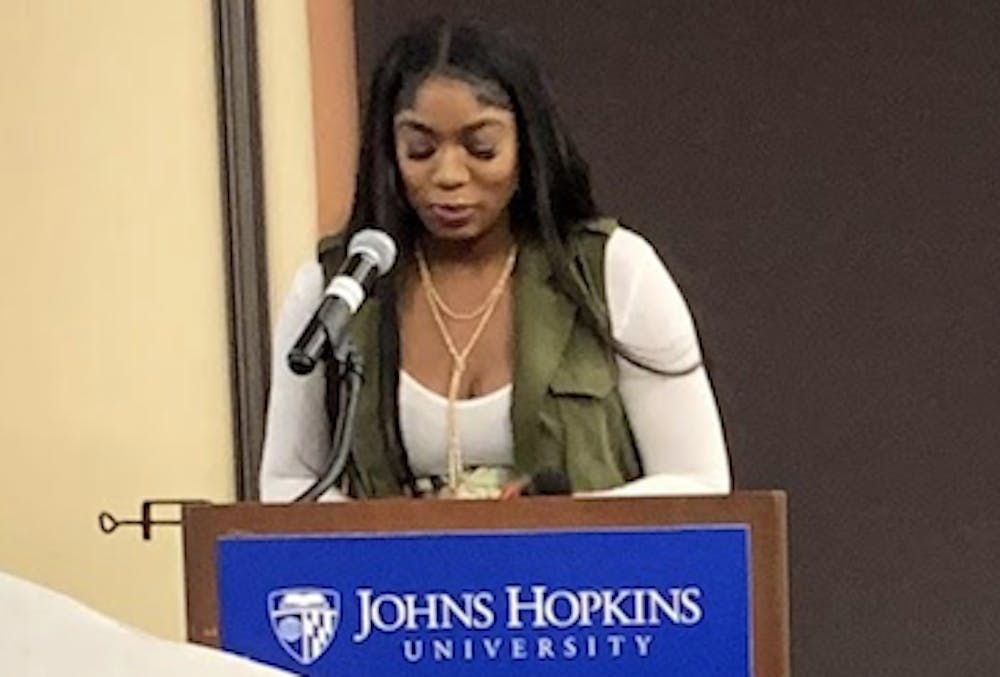Wendy Osefo gave a Black Heritage Celebratory Keynote Address on Wednesday in Charles Commons. Osefo is a Nigerian-American political commentator, television personality and assistant professor at the School of Education. Additionally, she founded The 1954 Equity Project, LLC which is a community-building project that serves underrepresented minority students in higher education.
The keynote address was a part of the Office of Multicultural Affairs’ (OMA) Heritage 365 initiative. Heritage 365 is OMA’s effort to promote black, LatinX, Asian-Pacific and Indigenous culture throughout the year. Assistant Director for Programming at OMA Kwame Phillips organized the event.
The event sought to advocate for celebration of Black history beyond the month of February.
Laolu Ogunnaike, a member of Alpha Phi Alpha fraternity, said that the event’s message about celebrating black history and culture year-round resonated with him.
“They kept emphasizing that Black heritage is a 365 day celebration and doesn’t end with February. Where you come from and also looking to the future is a key perspective,” he said.
The program began with a reception and introductory remarks from Director of Multicultural Affairs Joseph Colón. There was also a performance of “Lift Every Voice and Sing” by the Johns Hopkins Gospel Choir as well as a slam poetry performance.
Osefo’s keynote talk followed these performances. She discussed the importance of recognizing the impact of historical movements against discrimination, as well as solutions to persistent inequalities in the present.
Osefo discussed the sacrifices that past generations have made, and how the pioneers of each social justice movement were unified by a desire to create changes that would last beyond their own generations.
“The civil rights movement of the 1950s, the women’s suffrage movement for gender equality, the Black Lives Matter movement and the direct referendum violence against black and brown bodies and now Gen Z taking up the issue of gun reform — whichever side is the one you stand on, the common thread that is woven through each is the desire to change the world not for themselves, but for humanity,” she said.
While she did address the positive changes achieved by these movements, Osefo warned against an overemphasis on individuals breaking down barriers to success instead of focusing on achieving broad racial inclusivity.
According to her, there is too much emphasis on becoming trailblazers, when all people as a society should be focusing on creating lasting pathways for everyone to achieve success.
“That notion of being the first makes you feel like you’ve achieved and you have no more work to do. One of the issues I have with my generation is that we are self-absorbed and we really need to start thinking about the legacies we’re going to leave behind,“ she said.
“It’s not about being the first, it’s about making sure other people follow in your footsteps and you are able to create other opportunities for others who are like you,” she said.
For Osefo, collective resistance against historical discrimination is the key to creating lasting changes for the future.
“The beauty of anything is not just what we do, but what we leave behind, and if you can’t leave anything behind, then what you’ve done literally dies with you,“ she said.
Paul Larcom, a teacher and Baltimore resident, enjoyed the event and was pleased to hear Osefo’s remarks.
“It was great getting to hear from the keynote speaker and from everyone else about what we can do to support everyone,” he said.
Isabel Rios-Pulgar, an organizer for OMA, was especially impressed by Dr. Osefo’s speech and the idea of making sure you are not the last rather than focusing on being the first.
She emphasized that achieving racial inequality is a collective effort than an individual one.
“Dr. Wendy Osefo really took it to another level with her message that it’s not important to be the first, but it’s important that you pave the way for other people. Making sure you’re not the last one is the real mission, I feel like that’s an awesome message. Everyone is always wanting to be the first, to break the glass ceiling, but you should make sure it stays broken,“ she said.
Gabriela Sullen works for Johns Hopkins Health systems as an assistant specialist. She was impressed with the messaging and themes of the event, namely that history should be related to and positioned alongside current issues.
“The event was very empowering, and I thought that it was really nice to see how we not only need to move forward by looking back and remembering our history, but helping and pulling along those with us as we continue to gain more privilege and gain more recognition and gain more power,“ she said.





